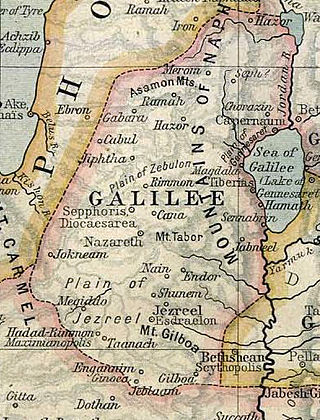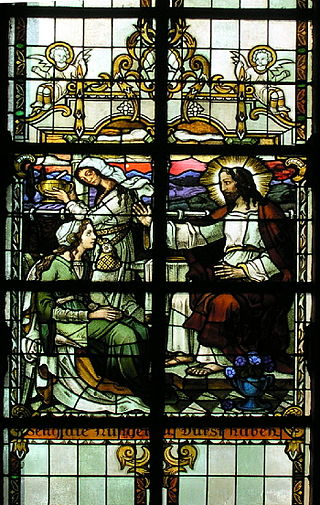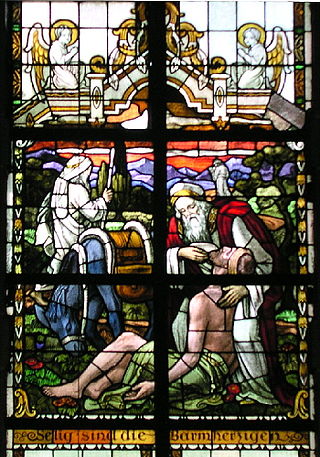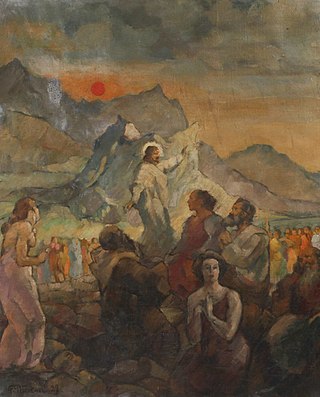
The Beatitudes are sayings of Jesus, and in particular eight or nine blessings recounted by Jesus in the Sermon on the Mount in the Gospel of Matthew, and four in the Sermon on the Plain in the Gospel of Luke, followed by four woes which mirror the blessings. Each is a proverb-like proclamation, without narrative.

Matthew 4:6 is the sixth verse of the fourth chapter of the Gospel of Matthew in the New Testament. Jesus has just rebuffed "the tempter's" first temptation; in this verse, the devil presents Jesus with a second temptation while they are standing on the pinnacle of the temple in the "holy city" (Jerusalem).

Matthew 4:14–15 are the fourteenth and fifteenth verses of the fourth chapter of the Gospel of Matthew in the New Testament. In the previous verses Jesus returned to Galilee after hearing of the arrest of John the Baptist and then left Nazareth for Capernaum. These introduce and then contain the first portion of a quote from the Book of Isaiah showing how these movements were preordained by scripture.

Matthew 5:4 is the fourth verse of the fifth chapter of the Gospel of Matthew in the New Testament. It is the second verse of the Sermon on the Mount, and the second of what are known as the Beatitudes.

Matthew 5:5 is the fifth verse of the fifth chapter of the Gospel of Matthew in the New Testament. It is the third verse of the Sermon on the Mount, and also the third of what are known as the Beatitudes.

Matthew 5 is the fifth chapter of the Gospel of Matthew in the New Testament. It contains the first portion of the Sermon on the Mount, the other portions of which are contained in chapters 6 and 7. Portions are similar to the Sermon on the Plain in Luke 6, but much of the material is found only in Matthew. It is one of the most discussed and analyzed chapters of the New Testament. Warren Kissinger reports that among early Christians, no chapter was more often cited by early scholars. The same is true in modern scholarship.

Matthew 5:6 is the sixth verse of the fifth chapter of the Gospel of Matthew in the New Testament. It is the fourth verse of the Sermon on the Mount, and also the fourth of what are known as the Beatitudes.

Matthew 5:7 is the seventh verse of the fifth chapter of the Gospel of Matthew in the New Testament. It is the fifth verse of the Sermon on the Mount, and also the fifth of what are known as the Beatitudes.

Matthew 5:10 is the tenth verse of the fifth chapter of the Gospel of Matthew in the New Testament. It is the eighth verse of the Sermon on the Mount, and also eighth, and to some the last, of what are known as the Beatitudes.

Matthew 5:12 is the twelfth verse of the fifth chapter of the Gospel of Matthew in the New Testament. It is the tenth verse of the Sermon on the Mount. This verse is generally seen as part of an expansion of the eight Beatitude, others see it as the second half of the ninth Beatitude, a small group feel it is the tenth Beatitude and thus brings to a close a second Decalogue.

Matthew 5:14 is the fourteenth verse of the fifth chapter of the Gospel of Matthew in the New Testament. It is part of the Sermon on the Mount, and is one of a series of metaphors immediately following the Beatitudes.

Matthew 5:22 is the twenty-second verse of the fifth chapter of the Gospel of Matthew in the New Testament and is part of the Sermon on the Mount. It is the first of what have traditionally been known as the 6 Antitheses. In this one, Jesus compares the current interpretation of "You shall not murder" from the Ten Commandments with his own interpretation.

Matthew 5:26 is the twenty-sixth verse of the fifth chapter of the Gospel of Matthew in the New Testament and is part of the Sermon on the Mount. Jesus has just warned that if you do not reconcile with your enemies a judge is likely to throw you in jail. In this verse Jesus mentions that your debts must be paid completely before one can leave.

Matthew 5:33 is the thirty-third verse of the fifth chapter of the Gospel of Matthew in the New Testament and is part of the Sermon on the Mount. This verse is the opening of the fourth antithesis, beginning the discussion of oaths.

Matthew 5:35 and Matthew 5:36 are the thirty-fifth and thirty-sixth verses of the fifth chapter of the Gospel of Matthew in the New Testament. They are part of the Sermon on the Mount. These verses are part of either the third or fourth antithesis, the discussion of oaths. Jesus tells his listeners in Matthew 5:34 "to not swear oaths" and in here presents examples of swearing oaths. In context, this passage refers not to the modern understanding of cursing or using foul language, but rather, the act of swearing oaths and making promises.

Matthew 7:19 and Matthew 7:20 are the nineteenth and twentieth verses of the seventh chapter of the Gospel of Matthew in the New Testament and are part of the Sermon on the Mount. The verses continue the section warning against false prophets.

Matthew 7:21 is the twenty-first verse of the seventh chapter of the Gospel of Matthew in the New Testament and is part of the Sermon on the Mount. This verse continues Jesus' warning against false prophets.

Matthew 28:1 is the first verse of the twenty-eighth chapter of the Gospel of Matthew in the New Testament. This verse opens the resurrection narrative as Mary Magdalene and "the other Mary" visit Jesus' tomb after the crucifixion.

Matthew 28:10 is the tenth verse of the twenty-eighth chapter in the Gospel of Matthew in the New Testament. This verse is part of the resurrection narrative. Having left the empty tomb, Mary Magdalene and "the other Mary" are on their way to meet the other disciples, when Jesus meets with them. In this verse the risen Jesus speaks with them.

Matthew 27:5 is the fifth verse of the twenty-seventh chapter of the Gospel of Matthew in the New Testament. This verse continues the final story of Judas Iscariot. In the earlier verse Judas had regretted his decision to betray Jesus, but is met with disinterest from the Jewish leaders. In this verse his response is to return the blood money and then commit suicide.




















